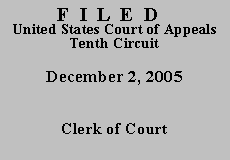

| UNITED STATES OF AMERICA, | No. 05-3095
(D.C. No. 97-CR-20045-03-KHV) (D. Kan.) |
Thomas was originally convicted of conspiracy to unlawfully possess or sell a stolen firearm in violation of 18 U.S.C. §§ 371 and 922(j). He was sentenced to 60 months' imprisonment and three years of supervised release.
Soon after Thomas was released from prison, he was arrested and pled guilty to violating the terms of his release. He was returned to prison for eight months and given twenty-four months of supervised release. After he was released from prison for the second time, Thomas was placed in a halfway house while on supervised release. He made five requests to move to Texas. Each of these requests was denied. Disregarding these denials, Thomas moved to Texas to take a job on an oil rig.
Thomas was caught and pled guilty to violating his supervised release. Thomas claimed that, because he was "a very independently minded person," he could not successfully complete supervised release. As such, he requested to be sentenced without further supervised release. Given his criminal history record and the offenses to which he pled guilty, the Sentencing Guidelines recommended that Thomas be given five to eleven months in prison. See U.S.S.G. § 7B1.4.
The court granted Thomas's request to not be put on supervised release again. However, because the court was not sentencing Thomas to supervised release in addition to prison time, and because Thomas's "track record here is basically to defy the court's authority to put any restrictions on [him] that [he] doesn't agree with," the court sentenced him to 13 months in prison, two months beyond the top of the range recommended in the Guidelines. Thomas appeals this decision, arguing that the district court abused its discretion in sentencing him above the range recommended by the policy statements of Chapter 7 of the Sentencing Guidelines and that the sentencing decision violated United States v. Booker, 125 S. Ct. 738 (2005).
The Chapter 7 provisions dealing with violations of supervised release are advisory policy statements. United States v. Contreras-Martinez, 409 F.3d 1236, 1240 (10th Cir. 2005). As such, Booker did not change the standard for decisions revoking supervised release. United States v. Tetford, 405 F.3d 1159, 1161 (10th Cir. 2005). The "imposition of a sentence in excess of that recommended by the Chapter 7 policy statements of the Sentencing Guidelines will be upheld if it can be determined from the record to have been reasoned and reasonable." Id. (quotations omitted). Determinations of fact are reviewed for clear error and legal interpretations of the Sentencing Guidelines are reviewed de novo. United States v. Kelly, 359 F.3d 1302, 1304 (10th Cir. 2004).
The district court imposed a sentence that exceeded the recommendations of the Sentencing Guidelines. In doing so, it first considered the policy statements of Chapter 7 of the Sentencing Guidelines, which govern the penalties that accompany the revocation of supervised release. It then issued a thirteen-month sentence because Thomas had repeatedly violated the rules of supervised release and had fled the state. The district court further justified its decision to impose a sentence outside the recommended range because it was not ordering more supervised release. It found that Thomas's conduct was "egregious" and hence merited an enhancement beyond the Guidelines range.
Thomas claims that the court gave no reason for imposing a sentence outside of the recommended Guidelines range. This is not so. The district court stated clearly that it was imposing a sentence outside of the range because of Thomas's flagrant disregard for the orders of the court and the probation office, and because he was not ordering further supervised release as part of the sentence.
We have previously held that district courts may consider "the futility of continued supervision" as a reason to depart from the Guideline range for sentences upon the revocation of supervised release. Tetford, 405 F.3d at 1161. The court below did precisely that. There is nothing unreasoned or unreasonable about a district court following the clear precedent of this court.
Thomas also argues that his case is not so exceptional that a departure is warranted. The district court held that this case was "more egregious" than most that come before it. We agree. It is certainly egregious behavior on the Thomas's part to flagrantly disregard the direct orders of the district court and the probation office and to flee the jurisdiction in which the defendant is serving his supervised release. The district court's sentencing order was both reasoned and reasonable.
For the reasons stated above, We AFFIRM the district court's sentencing order.
ENTERED FOR THE COURT
Carlos F. Lucero
Circuit Judge
*. The case is unanimously ordered submitted without oral argument pursuant to Fed. R. App. P. 34(a)(2) and 10th Cir. R. 34.1(G). This order and judgment is not binding precedent, except under the doctrines of law of the case, res judicata, and collateral estoppel. The court generally disfavors the citation of orders and judgments; nevertheless, an order and judgment may be cited under the terms and conditions of 10th Cir. R. 36.3.